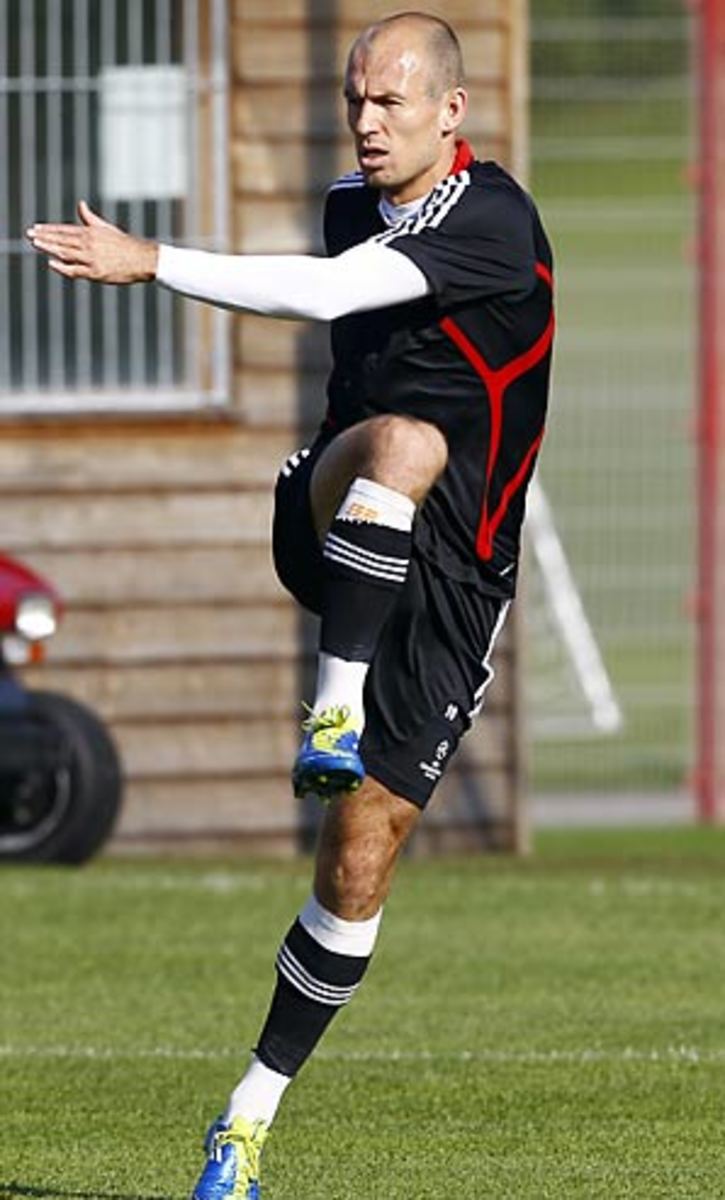Injured Robben a gloomy figure
At the beginning of the season, Bayern president Uli Hoeness was talking about an extension of the Dutchman's contract beyond 2013. "I'm pretty sure there will be talks with the board during the season," said the 59-year-old Hoeness. "Arjen knows that he's well looked after at Bayern, as far as medical treatment is concerned. And he knows that he can only play 80 to 90 percent of matches if he's looked after this medical team [of Bayern]. I'm quite confident the club will be able to renew the contract in the next few months."
Subsequent events have cast several doubts on this scenario, however. 80 to 90 percent, for a start, is increasingly looking like a hopelessly unrealistic target. After the 5-0 win over Hamburg on Aug. 20, Robben was laid low with an inflammation of the pubic bone. He returned as a substitute to score a goal against Leverkusen in the 3-0 win a month later but refused to talk to reporters after the match. His mood wasn't improved when Bayern coach Jupp Heynckes waited until the 88th minute before he was brought on in the 2-0 win over Manchester City in the Champions League. Robben didn't start the next game (0-0 away to Hoffenheim), either. "He told me that he's not quite ready," said Heynckes, who insisted that the player had agreed that coming on after the break was the better option. Robben looked unhappy and out of sorts in the second half, however, and once again blanked the media after the final whistle.
Joining up with the Dutch team was supposed to lift his spirits. But the Oranjes sent him back to Munich after a couple of days, citing a hernia problem. Robben underwent surgery immediately. Bayern CEO Karl-Heinz Rummenigge, who had harshly criticized the Netherlands' medical staff after the 2010 World Cup and threatened to sue for damages, thanked the Dutch for their "great sensitivity" this time; Dutch coach Bert van Marwijk, however, was still upset. Van Marwijk felt that Bayern doctor Hans-Wilhelm Müller-Wohlfahrt had indirectly blamed the Dutch for the player's problems by publicizing a slightly different diagnosis ("weak groin"). The "misunderstanding" (Rummenigge) was cleared up and relations were mended in view of a friendly between the sides that will take place next May. Robben's medical situation is far from clear though. Müller-Wohlfahrt initially said the winger would return to training "after 10 days." Rummenigge seemed to extend that timeframe last week, stating that Robben would come back "next Monday" but that prognosis was blown out of the water by Heynckes on Friday. "I've told him to do absolutely nothing for the next 14 days," said the coach. "He should go on holiday or home to Holland." Local papers are now reporting that he won't touch a ball before the end of November; well-informed Süddeutsche Zeitung even speculated that his condition is more serious than the club is letting on. Either way -- the whole first half of the season looks like it'll be a write off for him again, just like last year.
In a sense, this issue is hardly surprising. Robben and injuries sadly go together like beer and Bavaria. Bayern was well aware of his fragility before paying €25 million ($34M) for his services in 2009. At Säbener Strasse, they believed that Müller-Wohlfahrt, an internationally renowned expert who has successfully treated many global stars, could stabilize the player. They also felt that the upside was worth the expected downtime: a fully-fit Robben in full flight certainly has few peers, as the improbable run to the 2010 Champions League final proved.
But this fall's developments are especially worrying for a number of reasons. Firstly, the conflicting medical reports suggest that the Bayern staff is at a loss to pin down the exact problem, for once. Furthermore, Robben has apparently not helped matters himself, by showing gross impatience in training. A number of journalists were shocked to see him performing intensive, all-out sprints in the practice session before the Man City game. "He needs to be a bit calmer," warned Rummenigge. Thirdly, his enforced break seems to have coincided with the beginnings of a disenchantment between him and the rest of the team. Hoeness rightly questioned the football expertise of a journalist who'd ventured that the team might be better without the Dutchman -- "you obviously have no idea," said the president -- but his strong reaction also betrayed a real sense of unease about the level of ill-feeling.
Robben, ever the arch-individualist, markedly refused to celebrate with his colleagues after the City win -- a game that had seen Franck Ribéry's best performance since the Dutchman's arrival two years ago.
Off the record, one or two players are increasingly ready to criticize Robben's "me, me, me" attitude and playing style and it was probably no coincidence that his less than flattering nickname in the dressing room was leaked to Sport-Bild last week, either. The Bayern players call him "Aleinikow," after former Soviet international Sergej Aleinikov, apparently. It's a play on words: "allein" means "on your own" or "lonely" in German. Robben has felt rather isolated since compatriots Mark van Bommel and Louis van Gaal left Munich, the magazine reported.
In the light of these rumblings of discontent, Heynckes is understandably relaxed about Robben's absence. Bayern is doing fine without him, after all. But even his critics inside the dressing room readily concede that the club's international ambitions are unlikely to be achieved without a hefty dose of his egotistic brilliance, however. By February, both Robben's fitness and the relationship with his colleagues will have to improve quite dramatically if Bayern are to stand a chance to make the Champions League final. Unfortunately, neither outcome can currently be taken for granted.





